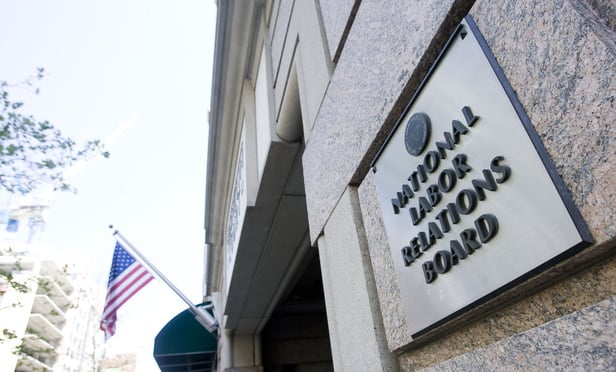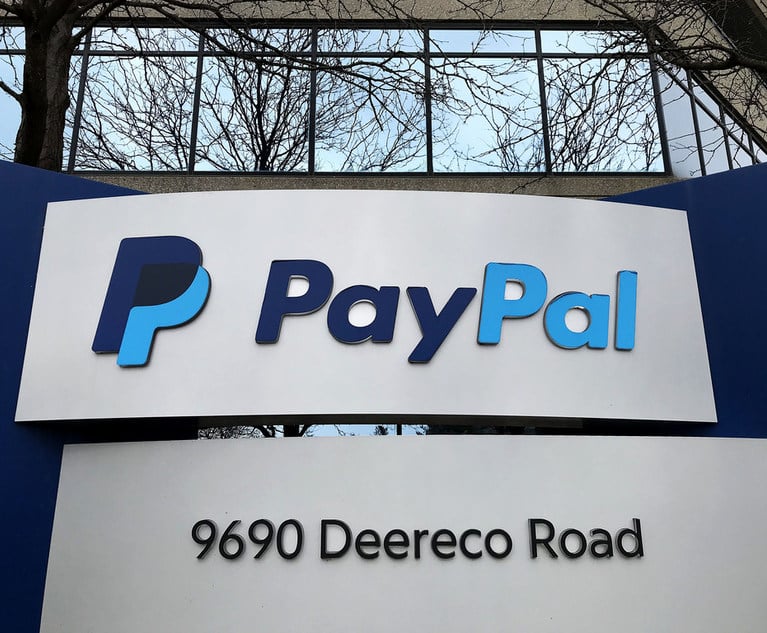Real Estate Firm CBRE's Arbitration Agreements Violate Labor Law: NLRB Judge
The real estate company CBRE Inc.'s mandatory arbitration agreements violate federal labor law, according to an administrative law judge ruling that highlighted controversial employee restrictions that are at the center of a U.S. Supreme Court case this term.
November 27, 2017 at 04:30 PM
5 minute read
 NLRB headquarters in Washington. Credit: Diego M. Radzinschi / ALM
NLRB headquarters in Washington. Credit: Diego M. Radzinschi / ALM
The real estate company CBRE Inc.'s mandatory arbitration agreements violate federal labor law, according to an administrative law judge ruling that highlighted controversial employee restrictions that are at the center of a U.S. Supreme Court case this term.
Administrative law judge John Giannopoulos at the National Labor Relations Board ruled that the global commercial real estate firm's employment agreements violate labor law by requiring that disputes be handled through arbitration and not through “any class, collective or representative action.”
The administrative case, filed by a CBRE facility manager named Steve Thoma, is far from settled. But it exposes the potential broad impact that the Supreme Court litigation could have on the power of employees to form class actions. Dozens of pending labor cases involving major companies will be affected by the outcome of the high-court litigation.
Littler Mendelson's Gordon Letter in Los Angeles, representing CBRE, was not immediately reached for comment Monday. A CBRE spokesman said in a statement: “We believe that this decision does not accurately apply the law to the facts, and we plan to appeal.”
Attorneys for Thoma did not immediately respond to request for comment on the administrative law judge's ruling.
Thoma has a pending civil case against CBRE and JPMorgan Chase that's on hold in the U.S. Court of Appeals for the Ninth Circuit. The appeals court, citing the action in the Supreme Court, is awaiting the outcome of the case there.
In October, the Supreme Court heard arguments in a consolidated case that considered whether workplace arbitration agreements that ban class actions violate the labor law because they constrict employees' right to engage in “concerted activities.” The consolidated cases before the justices are: National Labor Relations Board v. Murphy Oil USA; Epic Systems v. Lewis; and Ernst & Young v. Morris.
Thoma sued in California federal district court and filed a labor complaint in August with the NLRB, claiming he was misclassified as an exempt employee and therefore not entitled to overtime. His attorneys at California-based firm Baker, Curtis & Schwartz are seeking class action status for all similarly situated employees. Thoma's federal civil case alleges CBRE and Chase misclassified their facility managers to exempt them from overtime and other protections under California and federal law.
The NLRB administrative judge, ruling on Nov. 24, called CBRE's arbitration agreement “unlawfully vague and likely to leave employees unwilling to risk violating the rule by exercising Section 7 rights,” which allow workers to join together in concerted activity. Giannopoulos ordered CBRE to end agreements that restrict rights to file charges with the NLRB and rescind the arbitration agreement in all its forms.
One issue that might arise in any appeal in Thoma's administrative case could focus on recusals. William Emanuel, one Trump's two appointees to the NLRB, is a former Littler Mendelson shareholder in Los Angeles. Employee-side labor attorneys have raised questions about whether and when Emanuel should be required to recuse in current disputes that have ties to his firm or to his former clients.
Emanuel formerly represented CBRE and Chase, among 49 former clients that he said would cause him to recuse, for a year, unless he received a waiver, according to his financial disclosure filed at the U.S. Office of Government Ethics.
The CBRE case was one of dozens noted in a letter sent to Emanuel by Senate Democrats asking the new board member to clarify his commitment to not participating in cases involving former clients. Staff for Senate Democrats identified dozens of pending cases before the NLRB that involve the 49 companies Emanuel noted in his financial disclosure documents.
The administrative law judge's decision against CBRE is posted below.
This content has been archived. It is available through our partners, LexisNexis® and Bloomberg Law.
To view this content, please continue to their sites.
Not a Lexis Subscriber?
Subscribe Now
Not a Bloomberg Law Subscriber?
Subscribe Now
NOT FOR REPRINT
© 2025 ALM Global, LLC, All Rights Reserved. Request academic re-use from www.copyright.com. All other uses, submit a request to [email protected]. For more information visit Asset & Logo Licensing.
You Might Like
View All
Microsoft Becomes Latest Tech Company to Face Claims of Stealing Marketing Commissions From Influencers

PayPal Faces New Round of Claims; This Time Alleging Its 'Honey' Browser Extension Cheated Consumers

Free Microsoft Browser Extension Is Costing Content Creators, Class Action Claims
3 minute readTrending Stories
- 1States Accuse Trump of Thwarting Court's Funding Restoration Order
- 2Microsoft Becomes Latest Tech Company to Face Claims of Stealing Marketing Commissions From Influencers
- 3Coral Gables Attorney Busted for Stalking Lawyer
- 4Trump's DOJ Delays Releasing Jan. 6 FBI Agents List Under Consent Order
- 5Securities Report Says That 2024 Settlements Passed a Total of $5.2B
Who Got The Work
J. Brugh Lower of Gibbons has entered an appearance for industrial equipment supplier Devco Corporation in a pending trademark infringement lawsuit. The suit, accusing the defendant of selling knock-off Graco products, was filed Dec. 18 in New Jersey District Court by Rivkin Radler on behalf of Graco Inc. and Graco Minnesota. The case, assigned to U.S. District Judge Zahid N. Quraishi, is 3:24-cv-11294, Graco Inc. et al v. Devco Corporation.
Who Got The Work
Rebecca Maller-Stein and Kent A. Yalowitz of Arnold & Porter Kaye Scholer have entered their appearances for Hanaco Venture Capital and its executives, Lior Prosor and David Frankel, in a pending securities lawsuit. The action, filed on Dec. 24 in New York Southern District Court by Zell, Aron & Co. on behalf of Goldeneye Advisors, accuses the defendants of negligently and fraudulently managing the plaintiff's $1 million investment. The case, assigned to U.S. District Judge Vernon S. Broderick, is 1:24-cv-09918, Goldeneye Advisors, LLC v. Hanaco Venture Capital, Ltd. et al.
Who Got The Work
Attorneys from A&O Shearman has stepped in as defense counsel for Toronto-Dominion Bank and other defendants in a pending securities class action. The suit, filed Dec. 11 in New York Southern District Court by Bleichmar Fonti & Auld, accuses the defendants of concealing the bank's 'pervasive' deficiencies in regards to its compliance with the Bank Secrecy Act and the quality of its anti-money laundering controls. The case, assigned to U.S. District Judge Arun Subramanian, is 1:24-cv-09445, Gonzalez v. The Toronto-Dominion Bank et al.
Who Got The Work
Crown Castle International, a Pennsylvania company providing shared communications infrastructure, has turned to Luke D. Wolf of Gordon Rees Scully Mansukhani to fend off a pending breach-of-contract lawsuit. The court action, filed Nov. 25 in Michigan Eastern District Court by Hooper Hathaway PC on behalf of The Town Residences LLC, accuses Crown Castle of failing to transfer approximately $30,000 in utility payments from T-Mobile in breach of a roof-top lease and assignment agreement. The case, assigned to U.S. District Judge Susan K. Declercq, is 2:24-cv-13131, The Town Residences LLC v. T-Mobile US, Inc. et al.
Who Got The Work
Wilfred P. Coronato and Daniel M. Schwartz of McCarter & English have stepped in as defense counsel to Electrolux Home Products Inc. in a pending product liability lawsuit. The court action, filed Nov. 26 in New York Eastern District Court by Poulos Lopiccolo PC and Nagel Rice LLP on behalf of David Stern, alleges that the defendant's refrigerators’ drawers and shelving repeatedly break and fall apart within months after purchase. The case, assigned to U.S. District Judge Joan M. Azrack, is 2:24-cv-08204, Stern v. Electrolux Home Products, Inc.
Featured Firms
Law Offices of Gary Martin Hays & Associates, P.C.
(470) 294-1674
Law Offices of Mark E. Salomone
(857) 444-6468
Smith & Hassler
(713) 739-1250







